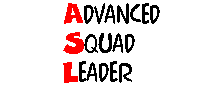
|
|
March Madness entered the new millennium with verve and innovation. The team from the old Time On Target ran the tournament. Mike Reed, personifying all that is good with ASL, was the director, and Paul SomethingOrOther took the place of his #2, previously held by Mark Neucom. Mark was not to be seen. |
It was held March 10-12 2000 in Kansas City
at a new location of the Raddison. While sounding posh, the hotel was little
more than a remodeled Hotel $79.99. The front staff could hardly answer my
question of getting back to the freeway, but I did get the directions in two
known languages, one unknown one and a passerby (possibly an out town guest) even
threw in his finger-pointing help. However, the accommodations were adequate
and, really, ASL only needs marginal ambiance to make it fun. It seems right to
mention at this point the modeling class taking place next door. While the
would-be models were no more than 14, it didn’t stop many of the guys from
ogling and, in turn, it didn’t stop many of the girls from being creeped out.
The small turn out was disappointing. March
Madness had been drawing crowds of 70 on a regular basis. I’d like the blame
the discourteous front desk help but apparently many were scared off by the
change of format: too bad for them. Still, about 20 players showed up and
considering you’re only going to play five of them, it didn’t matter much.
Needless to say even with less competition, I couldn’t place much above
average. There was even a father-son team present; reassuring in this day and
age.
Regardless, the point of the weekend was ASL
and we got plenty of that. The tournament introduced a twist: that of limited
fog of war. I hesitate to call it limited intelligence, since I’ve been doing
that most of my life. The scenarios were specially created for the weekend and
no one knew anything about them. Initially, cards were draw to make the
pairings. The Attackers went into one room and the defenders into another and
each group was briefed separately. This had a military motif, which is not
surprising since Mike and about everyone else in the room was military to some
degree. They presented nice overheads with the battleground (“maps” in ASL
terms), the enemy disposition (“units”), the overall situation (that textual
discussion next to the picture on each scenario), and the goals (victory
conditions). We were to write our own Aftermath. Afterwards, the counter pulling
begun and even after that, the games began.
The games were quite fun. For starters they
were varied. They ranged from early war French and German encounter, a Russian
clash in the desert-like steppes, Americans in the bocage and finally a
Jewish-British force assaulting a defensive line in Italy. Scenario sizes were
almost manageable. I don’t think a game was ever finished in the time allotted
although they did not run over too much. Only the Sunday afternoon game had to
be adjudicated on any serious scale. The largest was the Russian-German tank
battle during Kursk featuring every known Russian tank and three Churchills
against an equally mixed German force.
The thing everyone wants to know about is
the limited intelligence. In short: excellent idea if done right. And they did
it right. It’s a unique twist to be sure. Every tactic you know for ASL had to
be thrown out. While you knew what most of the enemy forces were, it was the
hidden or the unknown ones that made it fun. Gone was tactic of rushing a sector
because you knew the enemy has one anti-tank gun. Gone too was the ability to
count counters and to be secure in the fact that you found all his HIP units.
Since the scenarios were new to all the players, the experience level was evened
out, at least to some degree.
Players relied on their skills and quick
thinking to rather than some rote routine. The scenarios generally made everyone
a little more cautious even though caution may not have been the tactic needed.
For instance, the Germans could have won the Russian scenario easily if, from
the start, he sped straight for the VC. Instead, many players took slower
approaches. You got a feeling of how risky “bold” was. While we like to read
accounts of a leader or unit being bold, the same action could have ended in
disaster. In game terms, few players are willing to risk an entire eight-turn
game during the movement phase of the first turn. Logically and wisely, they
took a slower, more certain pace. I suspect we will see more tournaments like
this one.
As for the tournament organization, it was
well run, something we have come to expect from Mike Reed. The biggest complaint
was the rounds did not start on time. Somewhat expected due to the novel
structure of the tournament but did not effect too much. As usual, there were
always a few players up until three or four in the morning. “You can always
sleep in Abilene,” as the saying goes. The scenarios had way too many overlays
for my liking. Much of the setup time was spent managing these. However, people
have also come to expect special situations like this from the ToT crew.
Apparently if it’s not extensive and arcane SSRs, it’s overlays.